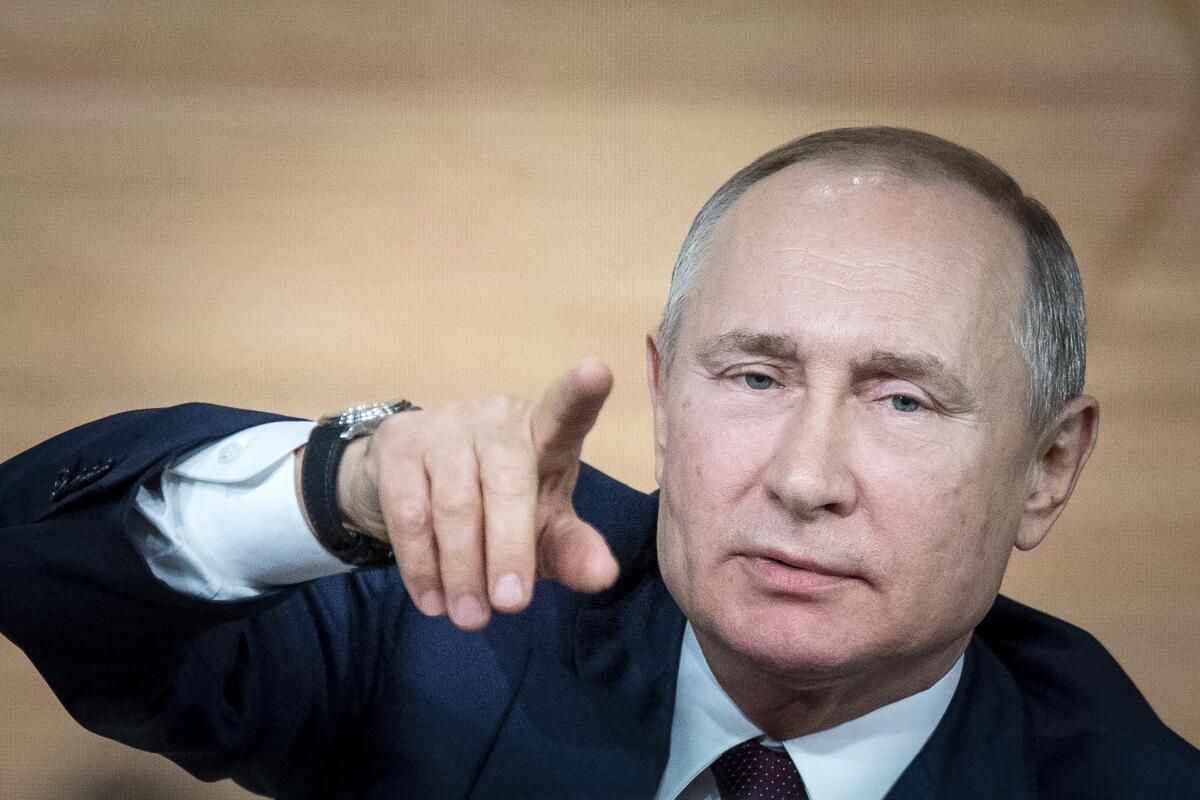Putin says Trump was impeached for ‘completely fabricated’ reasons

- Share via
MOSCOW — Russian President Vladimir Putin said Thursday that President Trump was impeached for “completely fabricated reasons,” calling the move by Democrats a continuation of their fight against the Republican leader.
“It’s unlikely they will want to remove from power a representative of their own party based on what are, in my opinion, completely fabricated reasons,” Putin said during his annual marathon news conference in Moscow. The conference lasted more than four hours and was the fifteenth such conference in Putin’s 20 years of power.
Democrats, Putin said, initiated the impeachment hearings because they lost the 2016 election. “They first accused Trump of a conspiracy with Russia. Then it turned out there wasn’t a conspiracy and that it couldn’t be the basis for impeachment. Now they have dreamt up some kind of pressure being exerted on Ukraine,” he said.
Trump on Wednesday became only the third American president to be impeached. The historic vote in the House of Representatives split along party lines over a charge that he abused the power of his office by trying to enlist the president of Ukraine to investigate a political rival ahead of the 2020 election. The House also approved a second article that he obstructed Congress in its investigation.
Putin’s news conference was dominated by domestic issues, such as Russia’s ailing healthcare system and federal subsidies for the regions.
He opened it by warning about new challenges posed by climate change, saying that global warming could threaten Russian Arctic cities and towns built on permafrost.
The Russian leader added that climate changes could trigger fires, devastating floods and other consequences.
Putin emphasized that Russia has abided by the Paris agreement intended to slow global warming. At the same time, he remarked that factors behind climate change have been hard to predict.
The 67-year-old president, who has been in power for two decades, also hailed the economic achievements of his rule. He emphasized that Russia has become the world’s largest grain exporter, surpassing the U.S. and Canada — a dramatic change compared to the Soviet Union, which heavily depended on grain imports.
He also pointed at industry modernization, saying that three-quarters of industrial equipment is no older than 12 years.
He said Russia has built three new airports and 12 new railway stations, and the number of major highways has doubled.
The Russian economy had suffered a double blow of a drop in global oil prices and Western sanctions that followed Moscow’s 2014 annexation of Crimea. It has seen a slow recovery since 2017 after a two-year stagnation.
Russia’s ties with the West have remained at post-Cold War lows, but Putin argued that Russia has recovered and become more resilient to shocks from Western penalties and fluctuations in global energy prices.
Putin voiced hope for further moves to settle the conflict in eastern Ukraine following his talks in Paris on Dec. 9 with the leaders of Ukraine, France and Germany.
He said that the 2015 peace agreement signed in Minsk and brokered by France and Germany must be observed, rejecting Ukrainian President Volodymyr Zelensky’s push for revising it.
The fighting in eastern Ukraine, which flared up in 2014 after Russia’s annexation of Crimea, has killed more than 14,000 and ravaged Ukraine’s industrial heartland.
The Minsk deal says Ukraine can regain control over the border with Russia in the separatist-held regions only after those regions are granted broad self-rule and hold local elections. The agreement was a diplomatic coup for Russia, ensuring that the rebel regions get a broad authority and resources to survive on their own without cross-border support.
Zelensky pushed for tweaking the timeline laid out in the accord so that Ukraine gets control of its border first before local elections are held, but Putin firmly rejected that.
“There is nothing but the Minsk agreement,” Putin said. “If we start revising the Minsk agreement, it will lead to deadlock.”
He said Russia still hopes to negotiate a new gas deal with Ukraine that will allow his country to maintain transit shipments of gas to Europe via Ukrainian territory. The Russian leader noted that Moscow would be ready to continue pumping gas via Ukraine even though the new prospective Nord Stream 2 pipeline under the Baltic Sea is expected to come online next year.
Putin, who once lamented the 1991 breakup of the Soviet Union as the greatest geopolitical catastrophe of the 20th century, had some harsh words about Soviet founder Vladimir Lenin.
He lambasted Lenin’s policies on ethnic issues, saying that his idea to grant broad autonomy to ethnic-based Soviet republics, including their right to secede, paved the way for the Soviet breakup once the Communist Party’s hold on power started to loosen.
At the same time, Putin rejected the push for taking Lenin’s embalmed body out of the Red Square tomb and burying it, saying that it would offend older people who still see the Soviet founder as a powerful symbol.
He noted that the Soviet demise spawned expectations of a “unipolar world” in which the U.S. dictates terms to others, adding that such “illusions” quickly collapsed. Putin said that China has come to challenge the U.S. as the global economic powerhouse, and he hailed increasingly close ties between Moscow and Beijing.
Putin, whose current term runs through 2024, remained coy about his political future. He wouldn’t say whether he could potentially extend his rule by shifting into a new governing position as head of a Russia-Belarus union.
He left the door open to amending the Russian Constitution, such as changing the powers of the president and the Cabinet, but noted that changes must be made carefully after a broad public discussion.
Times special correspondent Sabra Ayres contributed to this report.
More to Read
Sign up for Essential California
The most important California stories and recommendations in your inbox every morning.
You may occasionally receive promotional content from the Los Angeles Times.










